Comprehensive Guide to Garden Maintenance in Docklands
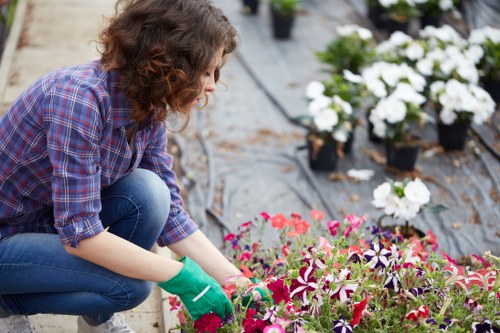
Introduction to Garden Maintenance in Docklands
Maintaining a **beautiful garden** in Docklands requires dedication, expertise, and a keen understanding of the local climate and soil conditions. Whether you're a seasoned gardener or a beginner, proper maintenance ensures your garden thrives throughout the year.
Docklands, known for its vibrant community and scenic waterfronts, offers a unique environment for gardening. The maritime climate influences plant growth, making it essential to choose the right plants and maintenance strategies.
In this article, we'll explore the best practices for **garden maintenance in Docklands**, covering everything from soil preparation to seasonal care.
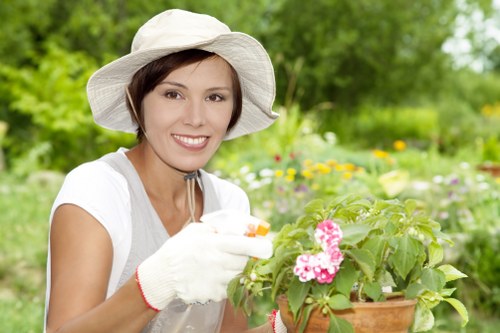
Understanding the Docklands Climate
The **Docklands climate** is characterized by mild winters and warm summers, with high humidity levels. This environment is conducive to a wide variety of plants, but it also presents challenges such as pest control and fungal diseases.
Understanding the local weather patterns is crucial for effective garden maintenance. Regularly monitoring temperature, rainfall, and wind conditions can help you make informed decisions about planting and care.
Implementing strategies like proper irrigation and mulching can mitigate the effects of the climate, ensuring your garden remains lush and healthy.
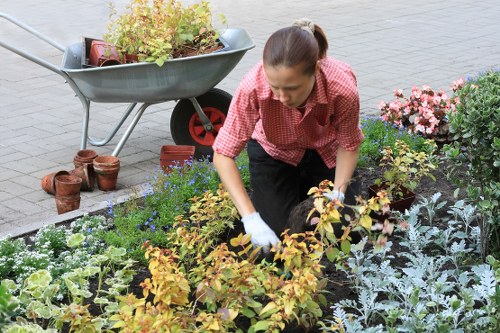
Soil Preparation and Improvement
Testing and Analyzing Soil
Before planting, it's essential to **test your soil** to determine its pH level, nutrient content, and texture. Soil testing kits are readily available and can provide valuable insights into what amendments your garden may need.
Analyzing soil structure helps in understanding its drainage capacity and aeration. Docklands' soil can vary, so tailoring your approach based on the test results is key to successful gardening.
Regular soil testing every few seasons ensures that your garden remains nutrient-rich and capable of supporting healthy plant growth.
Amending the Soil
Improving **soil fertility** involves adding organic matter such as compost, manure, or leaf mold. These amendments enhance soil structure, increase nutrient availability, and promote beneficial microbial activity.
Incorporating these materials into the soil can significantly boost plant health and resilience against pests and diseases.
Additionally, using cover crops or green manures during the off-season can naturally enrich the soil, preparing it for the next planting cycle.
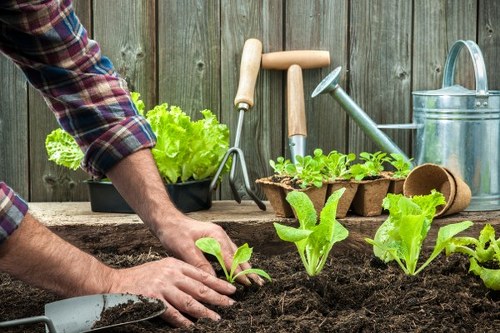
Plant Selection for Docklands Gardens
Choosing the right plants is fundamental to **successful garden maintenance**. Opt for species that are well-suited to Docklands' climate, considering factors like sunlight exposure, soil type, and moisture levels.
Native plants often require less maintenance and are more resistant to local pests and diseases. Incorporating a mix of evergreen and deciduous plants can provide year-round interest and structure to your garden.
Some popular plant choices for Docklands gardens include:
- Roses: Hardy and versatile, suitable for various garden styles.
- Lavender: Offers fragrance and attracts pollinators.
- Hostas: Ideal for shaded areas, providing lush foliage.
- Succulents: Low-maintenance options perfect for modern garden designs.
Perennials vs. Annuals
Incorporating both perennials and annuals can create a dynamic and ever-changing garden landscape. **Perennials** provide long-term structure and require less frequent replanting, while **annuals** offer vibrant color and diversity throughout the seasons.
Balancing both types ensures continuous blooming and a resilient garden ecosystem.
Understanding the specific needs and growth patterns of each plant type is essential for optimal placement and care.
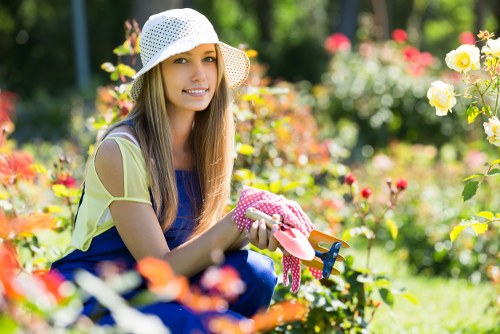
Regular Maintenance Practices
Pruning and Trimming
Regular **pruning and trimming** are vital for maintaining plant health and aesthetics. Removing dead or diseased branches prevents the spread of infections and encourages new growth.
Proper pruning techniques vary by plant species, so it's important to research or consult with a gardening expert to ensure you're not inadvertently harming your plants.
Trimming also helps in shaping plants, enhancing their natural form, and promoting better air circulation.
Weeding and Mulching
Weeds compete with your plants for nutrients, water, and light. Regular **weeding** keeps your garden tidy and reduces the risk of unwanted plants taking over.
Applying mulch not only suppresses weed growth but also helps in retaining soil moisture, regulating temperature, and adding organic matter to the soil as it decomposes.
Mulching should be done carefully to avoid smothering plants and ensuring adequate airflow around plant bases.
Irrigation and Water Management
Proper **irrigation** is crucial, especially during Docklands' warm summers. Installing an efficient watering system, such as drip irrigation or soaker hoses, ensures that plants receive the right amount of water without wastage.
Timing your watering to early mornings or late evenings can reduce evaporation and make the most of the available moisture.
Monitoring soil moisture levels helps in adjusting watering schedules based on seasonal changes and plant needs.

Pest and Disease Control
Maintaining a healthy garden involves proactive **pest and disease control**. Regular inspections help in early detection of issues, making management more effective and less invasive.
Implementing integrated pest management (IPM) strategies minimizes the use of chemical pesticides, promoting a more sustainable and eco-friendly garden environment.
Natural predators, such as ladybugs and birds, can help in keeping pest populations in check.
Organic Solutions
Using organic solutions like neem oil, insecticidal soaps, and homemade sprays can effectively manage pests without harming beneficial insects or the environment.
Cultivating a diverse garden ecosystem supports natural pest control and reduces the likelihood of severe infestations.
Regularly rotating crops and avoiding monocultures also contribute to a balanced and resilient garden.
Fungus and Disease Prevention
Fungal diseases can be a significant challenge in the humid Docklands climate. Ensuring proper plant spacing, adequate air circulation, and avoiding overhead watering can reduce the risk of fungal infections.
Applying fungicides when necessary and removing affected plant parts can help in managing disease outbreaks.
Choosing disease-resistant plant varieties is a proactive approach to preventing future issues.

Seasonal Garden Maintenance
Spring Care
Spring is an ideal time for **garden preparation**. Clearing debris, pruning dormant plants, and planting new species set the stage for a flourishing garden.
Applying a balanced fertilizer encourages robust growth as plants emerge from dormancy.
Early spring planting of perennials and annuals can take advantage of the growing season's full potential.
Summer Maintenance
During the summer months, focus on **watering and pest control**. Consistent moisture levels and vigilant monitoring help in maintaining plant health under the heat.
Deadheading spent flowers encourages continuous blooming and prevents plants from diverting energy into seed production.
Regularly harvesting vegetables and herbs promotes higher yields and keeps plants productive.
Autumn Preparations
Autumn is the time to prepare your garden for the colder months. Raking fallen leaves, composting, and adding mulch protect plants from winter frost.
Pruning summer-flowering plants and dividing perennials ensure they remain healthy and vigorous for the next season.
Planting spring bulbs and cover crops enhances soil fertility and sets the stage for next year's growth.
Winter Care
In winter, focus on **protecting your garden**. Covering sensitive plants with burlap, using cold frames, or moving potted plants indoors can prevent frost damage.
Maintaining garden tools and equipment during the off-season ensures they're ready for use in the spring.
Planning and designing your garden layout during winter can help in visualizing and preparing for future planting strategies.

Sustainable Gardening Practices
Adopting **sustainable gardening practices** not only benefits the environment but also creates a resilient and low-maintenance garden. Practices such as composting, rainwater harvesting, and using native plants contribute to sustainability.
Composting kitchen scraps and garden waste enriches the soil naturally, reducing the need for chemical fertilizers.
Rainwater harvesting systems capture and store rainwater, providing an eco-friendly irrigation source and reducing water bills.
Composting Techniques
Creating a compost pile or using a compost bin are effective ways to recycle organic waste. Maintaining the right balance of green (nitrogen-rich) and brown (carbon-rich) materials accelerates decomposition.
Regularly turning the compost and keeping it moist ensures efficient breakdown and high-quality compost production.
The resulting compost can be used to enrich garden beds, improve soil structure, and boost plant health.
Rainwater Harvesting
Installing rain barrels or a rainwater harvesting system captures runoff from rooftops, providing a sustainable water source for your garden.
Filtered and stored rainwater is free from the chemicals typically found in tap water, making it ideal for sensitive plants.
Implementing rain gardens and permeable pavements further enhances water conservation and reduces runoff.
Using Native Plants
Native plants are well-adapted to Docklands' climate and soil conditions, requiring less water and maintenance. They also support local wildlife and biodiversity.
Incorporating a variety of native species creates a balanced ecosystem, fostering pollinators and beneficial insects.
Choosing native plants reduces the need for fertilizers and pesticides, promoting a healthier garden environment.

Enhancing Garden Aesthetics
Design and Layout
A well-designed garden layout enhances both functionality and visual appeal. Planning pathways, seating areas, and plant arrangements creates a harmonious space.
Incorporating elements like water features, sculptures, or decorative lighting adds personality and charm to your garden.
Using complementary colors and textures among plants can create stunning visual contrasts and focal points.
Hardscaping Elements
Integrating hardscaping elements such as patios, pergolas, and fences provides structure and defines different garden zones.
Choosing materials that complement your garden's style and the Docklands' aesthetic ensures a cohesive look.
Proper maintenance of hardscaping materials prevents deterioration and maintains the garden's overall appeal.
Lighting and Accessories
Outdoor lighting extends the usability of your garden into the evening hours. Solar-powered lights, lanterns, and string lights create a warm and inviting atmosphere.
Garden accessories like benches, planters, and decorative containers add character and functionality.
Strategic lighting highlights key features and ensures safety along paths and access points.

Professional Garden Maintenance Services
While DIY gardening can be fulfilling, hiring **professional garden maintenance services in Docklands** offers numerous benefits. Professionals bring expertise, efficiency, and specialized tools to maintain your garden at its best.
Professional services include:
- Lawn Care: Mowing, fertilizing, aerating, and pest control.
- Planting and Pruning: Selecting appropriate plants and ensuring they are properly maintained.
- Landscape Design: Creating aesthetically pleasing and functional garden layouts.
- Seasonal Maintenance: Adapting care routines to seasonal changes for year-round garden health.
Engaging professionals saves time and ensures that your garden receives consistent and high-quality care.
Choosing the Right Service
Selecting a reputable garden maintenance service involves considering factors such as experience, range of services, customer reviews, and pricing. It's essential to communicate your garden goals and preferences to ensure alignment.
Requesting consultations or estimates can help you understand the scope of services and establish a working relationship with the chosen provider.
Regular communication and feedback ensure that the maintenance services meet your expectations and adapt to your garden's evolving needs.
Benefits of Professional Maintenance
Professionals offer tailored solutions based on your garden's specific requirements, ensuring optimal plant health and aesthetics.
Their expertise allows for troubleshooting issues promptly, preventing minor problems from escalating.
Investing in professional maintenance can increase your property's value and create a serene outdoor living space.
Cost Considerations
While professional services come with an investment, the long-term benefits often outweigh the costs. Efficient maintenance can reduce the need for costly repairs and replacements by ensuring your garden remains healthy and well-kept.
Many service providers offer flexible packages and pricing options to suit different budgets and garden sizes.
Comparing quotes and understanding what each package includes helps in making an informed decision.

DIY Tips for Effective Garden Maintenance
Regular Scheduling
Establishing a regular maintenance schedule helps in keeping your garden consistent and prevents tasks from piling up.
Setting aside specific times for watering, weeding, pruning, and other activities ensures that all aspects of your garden receive attention.
Utilizing garden planners or digital tools can aid in organizing and tracking maintenance tasks effectively.
Proper Tool Usage
Investing in quality gardening tools and maintaining them prolongs their lifespan and enhances efficiency. Clean, sharp tools make tasks easier and reduce the risk of plant damage.
Ensuring that tools are stored properly when not in use prevents rusting and other forms of deterioration.
Understanding the proper use of each tool contributes to safer and more effective gardening practices.
Educating Yourself
Continuously educating yourself about gardening techniques, plant care, and sustainable practices empowers you to make informed decisions and adapt to your garden's changing needs.
Attending workshops, reading gardening books, and following reputable online resources can expand your knowledge and skills.
Joining local gardening clubs or communities facilitates knowledge sharing and provides support from fellow gardeners.
Embracing Sustainability
Incorporating sustainable practices such as composting, rainwater harvesting, and using organic fertilizers contributes to a healthier garden and environment.
Reducing chemical usage and encouraging biodiversity promotes a balanced and resilient garden ecosystem.
Implementing these practices not only benefits your garden but also supports the broader environmental sustainability efforts.

Common Challenges in Docklands Garden Maintenance
Pest Infestations
Pests can quickly become a significant issue in any garden. Docklands' humid climate can exacerbate pest problems, making vigilant monitoring essential.
Identifying the specific pests affecting your garden allows for targeted and effective management strategies.
Encouraging natural predators and using organic remedies can help control pest populations without harming beneficial insects.
Weed Management
Weeds compete with your plants for essential resources. Regular weeding and mulching are effective methods to keep unwanted plants at bay.
Using ground covers and dense planting can naturally suppress weed growth, reducing the need for manual removal.
Herbicides can be used sparingly and as a last resort, ensuring minimal impact on the surrounding ecosystem.
Soil Erosion
Soil erosion can undermine your garden's structure and plant stability. Implementing erosion control measures such as retaining walls, terraces, and ground covers helps in maintaining soil integrity.
Planting deep-rooted species and using mulch can prevent soil displacement caused by heavy rains or wind.
Regularly inspecting and repairing erosion-prone areas ensures long-term garden stability and health.
Climate Variability
Unexpected weather patterns can pose challenges to garden maintenance. Being adaptable and prepared for extreme conditions helps in mitigating potential damage.
Implementing flexible gardening practices, such as adjustable irrigation systems and protective coverings, enhances resilience against climate variability.
Staying informed about upcoming weather forecasts allows for proactive measures to protect your garden.

Innovative Garden Maintenance Techniques
Smart Irrigation Systems
Integrating **smart irrigation systems** can revolutionize garden maintenance by automating watering schedules based on real-time weather data and soil moisture levels.
These systems optimize water usage, reduce waste, and ensure that plants receive the precise amount of water needed for optimal growth.
Remote monitoring and control features provide convenience and enhance efficiency in managing your garden's hydration needs.
Vertical Gardening
Vertical gardening maximizes space, especially in urban areas like Docklands. Utilizing vertical structures for planting allows for increased plant diversity and easier maintenance.
This technique is ideal for small gardens, balconies, or spaces with limited ground area, adding both functionality and aesthetic appeal.
Choosing appropriate vertical gardening systems and plant varieties ensures successful implementation and long-term sustainability.
Hydroponics and Soilless Cultivation
Exploring hydroponic methods offers an alternative to traditional soil-based gardening. These systems can be highly efficient, allowing for controlled nutrient delivery and reduced water usage.
Hydroponics is suitable for indoor or greenhouse settings, providing flexibility in plant selection and cultivation practices.
Understanding the requirements of hydroponic systems ensures successful growth and maintenance of plants without soil.
Companion Planting
Companion planting involves pairing compatible plants to enhance growth, deter pests, and improve soil health. This natural method promotes a balanced and resilient garden ecosystem.
Carefully selecting plant combinations based on their mutual benefits can lead to healthier plants and increased yields.
Researching effective companion plant relationships is key to successful implementation and garden harmony.

Legal and Environmental Considerations
Local Regulations
Understanding and adhering to local regulations is essential for **garden maintenance in Docklands**. Zoning laws, water usage restrictions, and environmental protection guidelines can impact your gardening practices.
Familiarizing yourself with these regulations ensures compliance and prevents potential legal issues.
Consulting with local authorities or gardening associations can provide clarity on applicable laws and best practices.
Environmental Sustainability
Maintaining an environmentally sustainable garden contributes positively to the local ecosystem. Practices like reducing chemical usage, conserving water, and promoting biodiversity support environmental health.
Implementing sustainable strategies not only benefits your garden but also aligns with broader environmental conservation efforts in Docklands.
Participating in community gardens or environmental initiatives fosters a sense of responsibility and collective action towards sustainability.
Waste Management
Proper garden waste management prevents environmental degradation and promotes recycling. Composting organic waste and responsibly disposing of non-compostable materials minimizes your garden's ecological footprint.
Using biodegradable containers and reducing single-use materials further enhances sustainable waste management practices.
Educating yourself about effective waste management techniques ensures your garden remains eco-friendly and sustainable.
Water Conservation
Water conservation is crucial, especially in areas with water restrictions. Implementing efficient watering systems, mulching, and choosing drought-tolerant plants reduces water consumption.
Rainwater harvesting and greywater recycling are effective methods for sustainable water use in the garden.
Educating yourself about water-efficient gardening practices contributes to long-term sustainability and resource conservation.

Conclusion and Next Steps
Effective **garden maintenance in Docklands** combines knowledge, planning, and sustainable practices to create a thriving outdoor space. By understanding the local climate, preparing the soil, selecting appropriate plants, and implementing regular maintenance routines, your garden can flourish year-round.
Whether you choose to maintain your garden personally or enlist professional services, the key lies in consistent effort and informed decision-making.
Embrace sustainable practices and innovative techniques to enhance your garden's beauty and resilience, contributing positively to both your surroundings and the environment.
Take Action Today
If you're ready to transform your Docklands garden, contact us today to book your garden maintenance service. Our team of experts is dedicated to helping your garden reach its full potential.
Book your service now and enjoy a lush, vibrant garden all year long!

